Reading Proust's In Search of Lost Time in 2014 discussion

This topic is about
The Guermantes Way
The Guermantes Way
>
Week ending 06/28: The Guermantes Way, finish
message 1:
by
Renato
(last edited May 11, 2014 09:28AM)
(new)
-
rated it 5 stars
May 11, 2014 08:51AM
 Mod
Mod
reply
|
flag
 I stand amazed. Amazed and in awe. I am a musical instrument, and Proust is the master musician. He's been playing me all along. Ahem. A quote:
I stand amazed. Amazed and in awe. I am a musical instrument, and Proust is the master musician. He's been playing me all along. Ahem. A quote:"We are bored at a dinner-table because our imagination is absent, and because it is bearing us company we are interested in a book."
It's a little out of context, but I'm starting to wonder if this is all intentional. Proust's narrator was completely in love with Mme. Guermantes, but when he finally hangs out with her, he finds her just like everyone else. He grows disenchanted with her. And so, what better way for Proust to impart these feelings than to bore the reader right along with the narrator?!?
Oh, Marcel, Marcel. You are truly devious!
 I haven't finished yet - I still have another 50 pages or so to read. But, I've not enjoyed this one as much as the first two. I'm hopeful, though, that this is just a middle-book lull and will pick back up in subsequent volumes.
I haven't finished yet - I still have another 50 pages or so to read. But, I've not enjoyed this one as much as the first two. I'm hopeful, though, that this is just a middle-book lull and will pick back up in subsequent volumes.
 OK, NOW I'm finished. But, I swear I must be missing something. The narrator said he saw something while he was waiting on the stairs for the Guermantes to return home, but that he'd relate that story later. Well, the volume is over, and he never brought the subject back up.
OK, NOW I'm finished. But, I swear I must be missing something. The narrator said he saw something while he was waiting on the stairs for the Guermantes to return home, but that he'd relate that story later. Well, the volume is over, and he never brought the subject back up.This is not the first time that this has happened, it's just the first time that I paid such close attention. Waiting. Interested and waiting. And then - nothing.
I really worry that when he finally gets around to sharing the rest of his story, I'll have forgotten everything that led up to it!
Sunny in Wonderland wrote: "OK, NOW I'm finished. But, I swear I must be missing something. The narrator said he saw something while he was waiting on the stairs for the Guermantes to return home, but that he'd relate that ..."
Ouch! 2 stars! I'm still only a third of the way through but it's ok so far. I'm thinking 3 or 4 stars at the moment.
I suppose when Proust says he'll reveal something later he doesn't necessarily mean in that volume - if we're thinking of the whole thing as a single novel.
I know what you mean about remembering stuff though; I find it difficult enough remembering details from the week before. Although I do find myself re-reading parts, or in some cases, all of the previous week's material. This is one of the benefits of reading it slowly.
My copies have a synopsis at the back of each volume which is useful for remembering or finding past material. Does yours?
Ouch! 2 stars! I'm still only a third of the way through but it's ok so far. I'm thinking 3 or 4 stars at the moment.
I suppose when Proust says he'll reveal something later he doesn't necessarily mean in that volume - if we're thinking of the whole thing as a single novel.
I know what you mean about remembering stuff though; I find it difficult enough remembering details from the week before. Although I do find myself re-reading parts, or in some cases, all of the previous week's material. This is one of the benefits of reading it slowly.
My copies have a synopsis at the back of each volume which is useful for remembering or finding past material. Does yours?
 No, I don't have anything like that in my edition (which is a cheesy, all-in-one version that I got for less than $5.) Occasionally I'll google the Proust characters, and there's a particular site that has a list of them and their relationships to each other. But, I hesitate to go there all the time because of the spoilers. (Just because someone isn't married in today's volume, doesn't mean they won't be married in tomorrow's volume!) And, I don't want the ending spoiled for me.
No, I don't have anything like that in my edition (which is a cheesy, all-in-one version that I got for less than $5.) Occasionally I'll google the Proust characters, and there's a particular site that has a list of them and their relationships to each other. But, I hesitate to go there all the time because of the spoilers. (Just because someone isn't married in today's volume, doesn't mean they won't be married in tomorrow's volume!) And, I don't want the ending spoiled for me.My rating I think would have been closer to 3 stars, but since I only gave volume 2 three stars, I wanted to rate this one relative to the whole. For my own benefit, anyway. LOL!
 Sunny in Wonderland wrote: "The narrator said he saw something while he was waiting on the stairs for the Guermantes to return home, but that he'd relate that he'd relate that story later. Well, the volume is over, and he never brought the subject back up.."
Sunny in Wonderland wrote: "The narrator said he saw something while he was waiting on the stairs for the Guermantes to return home, but that he'd relate that he'd relate that story later. Well, the volume is over, and he never brought the subject back up.."Proust will bring up what he saw on the stairs, in the beginning of S&G. Classic....and a dividing line in the novel. The longest sentence in the novel is in this section. Elsewhere, is the saddest sentence.
 Marcelita, THANK YOU! That makes me feel so much better! I'm not imagining stuff after all. LOL! AND, your intriguing comment about a dividing line... I wonder if that means I'll start enjoying it more like I was in the beginning...
Marcelita, THANK YOU! That makes me feel so much better! I'm not imagining stuff after all. LOL! AND, your intriguing comment about a dividing line... I wonder if that means I'll start enjoying it more like I was in the beginning...
 I finished Guermantes Way last night. Amazingly, Proust managed to turn the last 60 pages or so of this volume into a "barn-burner" for me. I just couldn't turn the pages fast enough to see what would happen next. Then I ran right off the end of the last page with a cry of NOoooooooo! It can't be over! But I am comforted by the fact that we have what, something like 2,000 pages to go.
I finished Guermantes Way last night. Amazingly, Proust managed to turn the last 60 pages or so of this volume into a "barn-burner" for me. I just couldn't turn the pages fast enough to see what would happen next. Then I ran right off the end of the last page with a cry of NOoooooooo! It can't be over! But I am comforted by the fact that we have what, something like 2,000 pages to go.-As I indicated, for me this volume had the strongest finish of the first three. I found the ending of the first two volumes muted and reflective and was not expecting the dramatic tensions (comedic intermixed with dramatic) that Proust achieved in the last two big scenes in the volume - The Narrator's call on Charlus, and the Narrator's call on the Duc and Duchesses.
- Sunny made an insightful remark about Proust's ability to elicit from the reader the correct empathetic response to the events in the novel. If we mentally groan, shuffle our feet and repeatedly look at our watch in despair as time creeps across a 100 page salon soiree or dinner party episode in the book, I see that as as Proust "making us suffer" along with the narrator, just as readers have suffered along with characters in countless tragic and cruel situations throughout the history of literature and story telling. What's more, Proust's social scenes and the agony of getting through them is something I easily relate to. I've suffered through many tedious social situations (none involving aristocrats - but family can be tedious too), but I've never been dying a painful death on the plains of East Africa or in a foxhole, I've never been on a doomed ship sinking in icy waters of the North Atlantic, or trapped on an Island full of dinosaurs. All this reminds me that what Proust has to say has at least the potential to inform my own life-experience in an insightful way if I remain watchful and alert.
- Spoiler alert, read what follows after finishing this volume.
- Getting back to eliciting an empathetic response, I was astonished (along with the narrator) at how the call on Charlus unfolds. Charlus sarcasm, contempt, fury, screaming, cajoling, cooing, crying - all contrived. And the Narrator's response, finally the narrator actually gets mad! Get enraged! And, seeking an object to expend his fury he attacks Charlus Top Hat! In the midst of drama, comedy. The attack on the hat seems the climax of this scene - made me wish I had an Illustrated "In Search of Lost Time" with a drawing of the hat attack.
- But it was the final scene of the volume that made the biggest impression on me. The narrator, the Duc and Duchess of Guermantes, Swann and several footmen. So much going on simultaneously. Among the the Duc scheming to keep from receiving word a relative has died so his social plans are not frustrated, the Duchess in a huff because a woman has called that morning and miserably violated calling card etiquette. The Duc and Duchess arguing fiercely over who they are related to and why. And in the midst of all the pomposity and vanity stands the dying Swann (a reference to Swan Lake perhaps) transformed from his previous persona in earlier volumes and speaking truth brutally when asked an opinion. As usual, the narrator says little, but serves as the camera to record the scene. When Swann finally is forced to tell the Guermantes he is dying their reaction is classic. They simply refuse to accept reality - the Duchess returns upstairs to change shoes, calling after her to invite Swann to lunch. The Duc shoves Swann and the narrator out the door, calling after Swann that doctors are donkeys and that he will "outlive us all.
-Wow!
 “'But, my dear Charles, I’m longing to see your photograph.'
“'But, my dear Charles, I’m longing to see your photograph.''Ah! Extinctor draconis latrator Anubis,' said Swann.
'Yes, it was so charming what you said about that apropos of San Giorgio at Venice. But I don’t understand why Anubis?'" MP
Why does Proust have Swann say, "Extinctor draconis latrator Anubis?"
Ah, the layers.
Proust and Venice
By Peter Collier
http://books.google.com/books?id=VvcW...
 Re-post....on finding passages.
Re-post....on finding passages. Yes, it's frustrating trying to "quote," especially when you don't know where it is...and need to scroll through the text.
Now, if you spoke French, this is a great site!
http://alarecherchedutempsperdu.org
*With the English translation...which is terrible, but you can at least find the location.
http://translate.google.com/translate...
Try and see if this works for you.
Look for #265: "If there was any time quarrels and if one little remained at the Duchess"
It's the end of The Guermantes Way.
 Marcelita wrote: "“'But, my dear Charles, I’m longing to see your photograph.'
Marcelita wrote: "“'But, my dear Charles, I’m longing to see your photograph.''Ah! Extinctor draconis latrator Anubis,' said Swann.
'Yes, it was so charming what you said about that apropos of San Giorgio at Venice..."
The link says the book is unavailable. My latin is shaky, but since Swann is dying, the photograh has to do with family ancestors and Annubis is the Egyptian God of the dead, my guess is Swann is wryly noting that the Lord of the dead show her the "underworld" i.e. her own dead ancestors.
Didn't read anything cause I hate spoilers - just came in to say you're making me very curious to finish the book!
 Dave wrote: "Marcelita wrote: "“'But, my dear Charles, I’m longing to see your photograph.'
Dave wrote: "Marcelita wrote: "“'But, my dear Charles, I’m longing to see your photograph.''Ah! Extinctor draconis latrator Anubis,' said Swann.
'
"The link says the book is unavailable..."
I went back to check...and realized I am logged into my "Google" account, so I was accessing "Google Books."
http://books.google.com/books?id=VvcW...
That may be the reason.
"Proust and Venice" by Peter Collier (page 38)
Here is the art mentioned in the last portion of The Guermantes Way:
The narrator is alluding here to The Legend of Saint Ursula, a series of nine paintings by Carpaccio and to Memling’s The Reliquary of St Ursula, a carved and gilded wooden reliquary containing oil on panel inserts:

Glory of St. Ursula, Vittore Carpaccio
The eight other paintings from this series can be found on this Wikipedia page.
The Reliquary of St Ursula (1489) by Hans Memling is really jaw dropping!
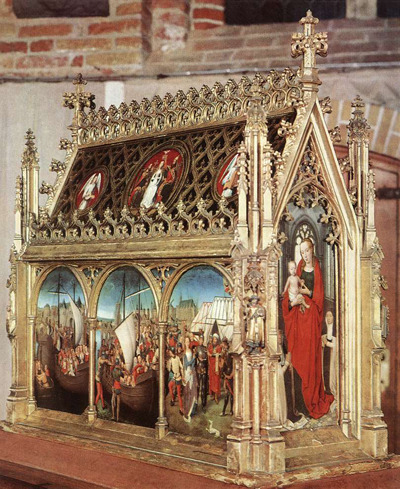
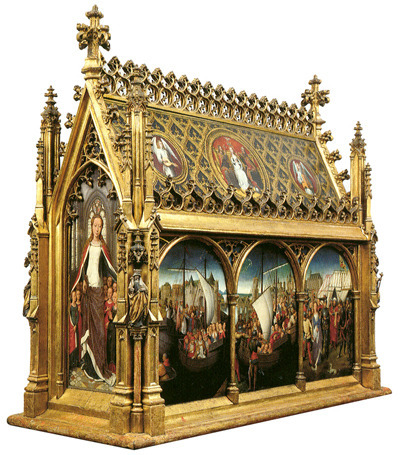
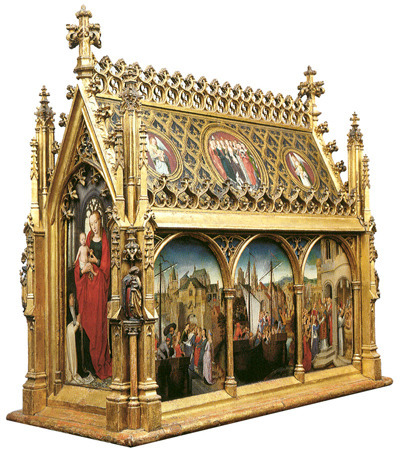
And some details:
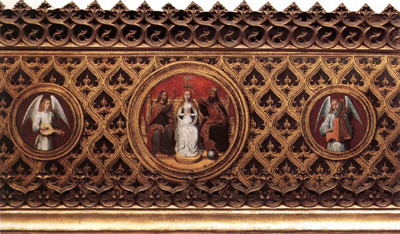


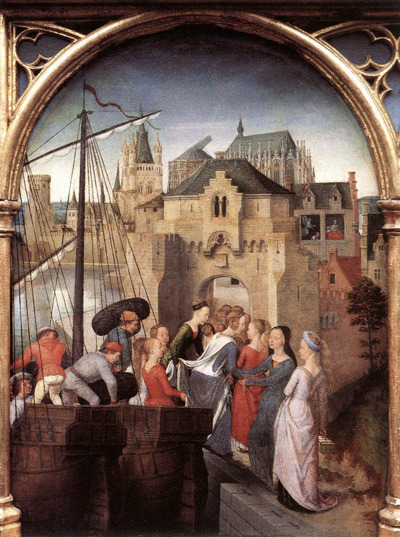
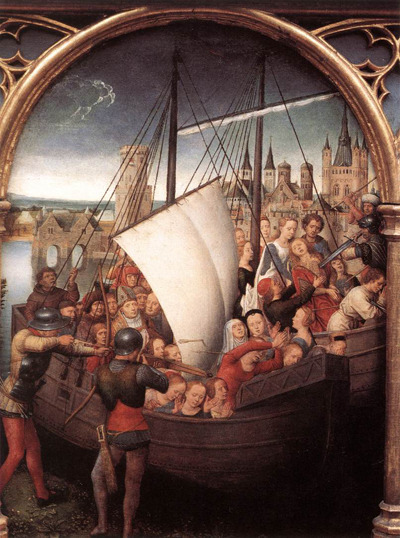
---
During the visit our narrator paid to de Charlus, the mad man mentioned:
Here are a couple of Joseph William Turner’s rainbow paintings:

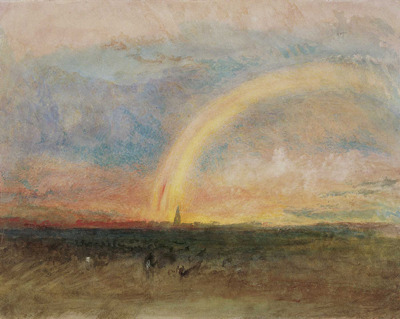
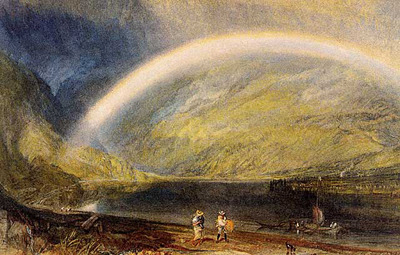
According to my annotated version, the “joy after the storm” part that was mentioned is found in Beethoven’s Pastoral Symphony no. 6, Op 68, 5th movement, and not in the third part as mentioned.
As if that wasn’t enough for our narrator to endure, he added more:
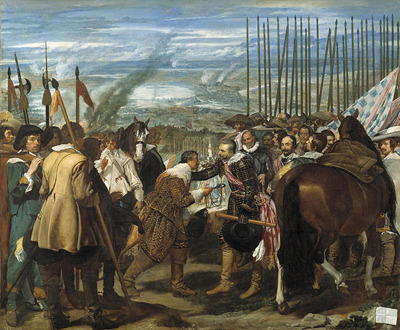
The Surrender of Breda, or Las lanzas, Diego Velázquez
“At once I was lost in contemplation of a casket, such as Carpaccio or Memling used to paint, from its first panel in which the Princess, at the wedding festivities of her brother the Duc d'Orléans, appeared wearing a plain garden dress to indicate her resentment at having seen the return, empty-handed, of the ambassadors who had been sent to sue on her behalf for the hand of the Prince of Syracuse, down to the last, in which she had just given birth to a son, the Duke of Württemberg (the first cousin of the Prince whom I had met at dinner), in that castle called Fantaisie, one of those places which are as aristocratic as certain families.”
The narrator is alluding here to The Legend of Saint Ursula, a series of nine paintings by Carpaccio and to Memling’s The Reliquary of St Ursula, a carved and gilded wooden reliquary containing oil on panel inserts:

Glory of St. Ursula, Vittore Carpaccio
The eight other paintings from this series can be found on this Wikipedia page.
The Reliquary of St Ursula (1489) by Hans Memling is really jaw dropping!



And some details:





---
During the visit our narrator paid to de Charlus, the mad man mentioned:
“Perhaps you are suffering from an affection of the optic nerve. If you like this kind of beauty better, here is a rainbow by Turner beginning to shine out between these two Rembrandts, as a sign of our reconciliation. You hear: Beethoven has come to join him." And indeed one could hear the first chords of the third part of the Pastoral Symphony, 'Joy after the Storm,' performed somewhere not far away, on the first landing no doubt, by a band of musicians.”
Here are a couple of Joseph William Turner’s rainbow paintings:



According to my annotated version, the “joy after the storm” part that was mentioned is found in Beethoven’s Pastoral Symphony no. 6, Op 68, 5th movement, and not in the third part as mentioned.
As if that wasn’t enough for our narrator to endure, he added more:
“”Just as, in Velazquez's Lances,” he went on, "the victor advances towards him who is the humbler in rank, as is the duty of every noble nature, since I was everything and you were nothing, it was I who took the first steps towards you.”

The Surrender of Breda, or Las lanzas, Diego Velázquez
Sunny in Wonderland wrote: "But, I swear I must be missing something. The narrator said he saw something while he was waiting on the stairs for the Guermantes to return home, but that he'd relate that story later. Well, the volume is over, and he never brought the subject back up."
Sunny, I also kept waiting for him to return to that! Glad Marcelita cleared it up for us.
Another plot I kept waiting to be peeled was Charles Morel visit to the narrator, which never happened... in this volume at least.
Sunny, I also kept waiting for him to return to that! Glad Marcelita cleared it up for us.
Another plot I kept waiting to be peeled was Charles Morel visit to the narrator, which never happened... in this volume at least.
 Renato wrote: "Sunny in Wonderland wrote: "But, I swear I must be missing something. The narrator said he saw something while he was waiting on the stairs for the Guermantes to return home, but that he'd relate t..."
Renato wrote: "Sunny in Wonderland wrote: "But, I swear I must be missing something. The narrator said he saw something while he was waiting on the stairs for the Guermantes to return home, but that he'd relate t..."Where was it mentioned that Morel would visit the narrator Renato? I missed that. In an age of ebooks,I've thought more than once that when the narrator mentions he will get back to something (or refers to something previous) it would be nice to have embedded links in the text to take you to the referenced text. Perhaps there. are charts in various books on Proust that do this. On the other hand I would be too tempted to cheat and peek. Having seen the mess that are the manuscript pages, I'm dumbfounded that Proust could keep track of all these cross references.
It wasn't mentioned anywhere that Morel would visit him again, Dave. Sorry for the confusion, I meant to say that after his visit to the narrator, I expected we'd be seeing more from him as he seemed to be such an interesting character.
;) oh thanks! I just remembered Marcelita told us some weeks ago that there's a scene between de Charlus and him coming in Vol. 4! Can't wait!
 I'm three quarters finished with Sodom and Gommorah and it is my favorite volume so far. Every scene, large or small really captures my interest.
I'm three quarters finished with Sodom and Gommorah and it is my favorite volume so far. Every scene, large or small really captures my interest.
 Yes, and I'm already suffering reader's remorse. I have a sinking feeling in my stomach that after this Volume, I've only got three more Volumes! It's beginning to look like I may read all Seven Volumes! Arrrrgggghhhh! Then it will be over!!!! I'm trying to steady my nerves with the thought that I can just continually re-read Proust all my life. But the first time is always special.
Yes, and I'm already suffering reader's remorse. I have a sinking feeling in my stomach that after this Volume, I've only got three more Volumes! It's beginning to look like I may read all Seven Volumes! Arrrrgggghhhh! Then it will be over!!!! I'm trying to steady my nerves with the thought that I can just continually re-read Proust all my life. But the first time is always special.
That's true. But Proust is so layered, there are so many things going on at once, there are so many perspectives to enjoy while reading ISOLT that I think we're not even absorbing everything from this first reading. So we'll be getting new little treasures from every one of our further readings!
I enjoyed so much the narrator's irony when he was talking about those Faubourg Saint-Germain gatherings that he for so long desired to be a part of, and then, after being disappointed (oh really?), he wondered:
"Already I had made several attempts to slip away, on account, more than for any other reason, of the triviality which my presence at it imparted to the gathering, albeit it was one of those which I had long imagined as being so beautiful—as it would doubtless have been had there been no inconvenient witness present. At least my departure would permit the other guests, once the profane intruder was no longer among them, to constitute themselves at length into a secret conclave. They would be free to celebrate the mysteries for the celebration of which they had met together, for it could obviously not have been to talk of Franz Hals or of avarice, and to talk of them in the same way as people talk in middle-class society. They uttered nothing but trivialities, doubtless because I was in the room, and I felt with some compunction, on seeing all these pretty women kept apart, that I was preventing them by my presence from carrying on, in the most precious of its drawing- rooms, the mysterious life of the Faubourg Saint-Germain. But this departure which I was trying at every moment to effect, M. and Mme. de Guermantes carried the spirit of self-sacrifice so far as to postpone, by keeping me in the room. A more curious thing still, several of the ladies who had come hurrying, delighted, beautifully dressed, with constellations of jewels, to be present at a party which, through my fault only, differed in no essential point from those that are given elsewhere than in the Faubourg Saint-Germain, any more than one feels oneself at Balbec to be in a town that differs from what one's eyes are accustomed to see—several of these ladies retired not at all disappointed, as they had every reason to be, but thanking Mme. de Guermantes most effusively for the delightful evening which they had spent, as though on the other days, those on which I was not present, nothing more used to occur.
Was it really for the sake of dinners such as this that all these people dressed themselves up and refused to allow the penetration of middle-class women into their so exclusive drawing-rooms—for dinners such as this? The same, had I been absent? The suspicion flashed across my mind for a moment, but it was too absurd. Plain commonsense enabled me to brush it aside. And then, if I had adopted it, what would have been left of the name Guermantes, already so degraded since Combray?"
Dave wrote: "- Getting back to eliciting an empathetic response, I was astonished (along with the narrator) at how the call on Charlus unfolds. Charlus sarcasm, contempt, fury, screaming, cajoling, cooing, crying - all contrived. And the Narrator's response, finally the narrator actually gets mad! Get enraged! And, seeking an object to expend his fury he attacks Charlus Top Hat! In the midst of drama, comedy. The attack on the hat seems the climax of this scene - made me wish I had an Illustrated "In Search of Lost Time" with a drawing of the hat attack."
This whole section was truly amazing, one of the top highlights for me in the entire volume. There were so many emotions floating around at the same time, from both of them. If emotions were to be represented by colors in that scene, we'd be seeing a crazy abstract colorful whirlwind above their heads.
Do you think someone did really tell him the narrator spoke badly of him, or was de Charlus simply trying to be manipulative, to get the narrator to feel like he owed him something - like an apology or some sort of compensation - and that he should therefore try to please the mad man in some way?
Then, some time after their relations supposedly ended once de Charlus left the narrator at home, he received an invitation to the Princesse de Guermantes salon - which Charlus made a point of saying he would never get in without his recommendation. Guess he's not over trying to bond with him after all...
This whole section was truly amazing, one of the top highlights for me in the entire volume. There were so many emotions floating around at the same time, from both of them. If emotions were to be represented by colors in that scene, we'd be seeing a crazy abstract colorful whirlwind above their heads.
Do you think someone did really tell him the narrator spoke badly of him, or was de Charlus simply trying to be manipulative, to get the narrator to feel like he owed him something - like an apology or some sort of compensation - and that he should therefore try to please the mad man in some way?
Then, some time after their relations supposedly ended once de Charlus left the narrator at home, he received an invitation to the Princesse de Guermantes salon - which Charlus made a point of saying he would never get in without his recommendation. Guess he's not over trying to bond with him after all...
""If she finds you still here she will start talking again, she is tired out already, she'll reach the dinner-table quite dead. Besides, I tell you frankly, I'm dying of hunger.""
Lovely choice of words to say to a dying man... way to go, Duc de Guermantes!
Top Charlus quotes:
'One of these days you'll mistake Mme de Villeparisis's lap for the toilet seat, and one begins to wonder what you'd leave in it.'
'Do you imagine that the poisonous spittle of five hundred little men of your sort, hoisted on to each other's shoulders, could even drool down on to the tips of my august toes?'
'These are all the hats worn by Madame Elisabeth, the Princess de Lamballe and Marie-Antoinette. You're not interested, are you? You appear not to see them. Perhaps there's something wrong with your optic nerve.'No wonder the narrator tore up Charlus' top hat!
 I read somewhere that Charlus was "one of the strongest characters". I was not sure what to make of that at first. But I don't think it is giving too much away to say that where I am in the reading now, when he arrives on the scene I say to myself "Oh good, here's Charlus, things will get interesting now."
I read somewhere that Charlus was "one of the strongest characters". I was not sure what to make of that at first. But I don't think it is giving too much away to say that where I am in the reading now, when he arrives on the scene I say to myself "Oh good, here's Charlus, things will get interesting now."
Dave wrote: "But I don't think it is giving too much away to say that where I am in the reading now, when he arrives on the scene I say to myself "Oh good, here's Charlus, things will get interesting now." "
Spot on, Dave! I had exactly that reaction when the narrator finally left the Guermantes' party to visit Charlus: "Oh good, here's Charlus, things will get interesting now."
I have a natural attraction to characters in novels like Charlus. I mean by the way they're portrayed rather than the specific idiosyncracies of Charlus; I mean a sort of Dickensian character with specific, well-defined characteristics, almost cartoonish, almost a lampoon of a type of person.
Spot on, Dave! I had exactly that reaction when the narrator finally left the Guermantes' party to visit Charlus: "Oh good, here's Charlus, things will get interesting now."
I have a natural attraction to characters in novels like Charlus. I mean by the way they're portrayed rather than the specific idiosyncracies of Charlus; I mean a sort of Dickensian character with specific, well-defined characteristics, almost cartoonish, almost a lampoon of a type of person.
Charlus is a very interesting character, I agree. I can't wait to see what he'll do next, specially after all the craziness that happened in that visit!
I found these on Google:
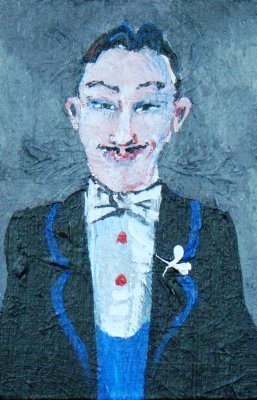

For some reason I pictured him older and fat. And short. And balding. Where did I get that from?! I don't remember if the narrator ever described him physically. Do you guys remember?
I found these on Google:


For some reason I pictured him older and fat. And short. And balding. Where did I get that from?! I don't remember if the narrator ever described him physically. Do you guys remember?
 Renato wrote: "Charlus is a very interesting character, I agree. I can't wait to see what he'll do next, specially after all the craziness that happened in that visit!
Renato wrote: "Charlus is a very interesting character, I agree. I can't wait to see what he'll do next, specially after all the craziness that happened in that visit!I found these on Google:
Renato, I never thought of him as short and fat. Those pictures seem more or less what I picture in my mind. The voices that the reader gives to each character in the Audio Book shape my visualization. The reader does an excellent job on Charlus (actually all the voices are good).
Jonathan, I liked your comparison to Dickens in characterization. I'm a big fan of Dickens.
For some reas..."
 On figuing age Renato, I make do with trying to keep track of generations. Mme. Villparesis is an aunt of the Duchess, an older woman but not frail (60's), Saint Loup is the Duchesses' nephew (early 20's), that puts the Duc and Duchess in mid-40s to early 50's. Charlus is the Duc's younger brother (mid-40's). Sometimes there is reference to historical events that help establish age of characters.
On figuing age Renato, I make do with trying to keep track of generations. Mme. Villparesis is an aunt of the Duchess, an older woman but not frail (60's), Saint Loup is the Duchesses' nephew (early 20's), that puts the Duc and Duchess in mid-40s to early 50's. Charlus is the Duc's younger brother (mid-40's). Sometimes there is reference to historical events that help establish age of characters.
Oh, thanks a lot, Dave! I had figured out the Duc as being 40-ish, but I had forgotten de Charlus was his younger brother though!
 Renato, just came upon a scene where Charlus is described as "that stout gentleman with his grey hair, his black moustaches, his lips reddened with a salve..." So the pictures above may be too slim. He is often descibed as having "half-closed eyes". He is also mistaken for "an Israelite".
Renato, just came upon a scene where Charlus is described as "that stout gentleman with his grey hair, his black moustaches, his lips reddened with a salve..." So the pictures above may be too slim. He is often descibed as having "half-closed eyes". He is also mistaken for "an Israelite".
Thanks for that! I guess he looks slim-ish in those drawings, although in the 2nd one he is kind of robust? I can also see the "half-closed eyes" on the 1st one and some shades of grey on his hair.
BTW did everyone notice that when Prince Von & M. de Guermantes are discussing Norpois and the Anglo-French alliance Mme Guermantes pipes up and says 'I find King Edward a charming man...' which would mean the party couldn't be before 1901, when Victoria was still queen.
Renato wrote: """If she finds you still here she will start talking again, she is tired out already, she'll reach the dinner-table quite dead. Besides, I tell you frankly, I'm dying of hunger.""
Lovely choice of words to say to a dying man... way to go, Duc de Guermantes!"
Yeah, I noticed that as well, Renato. Just before Swann's revelation Mme Guermantes said 'Oh my dear Charles...how tiresome these dinners can be. There are evenings when one would sooner die! But of course dying is perhaps just as tiresome, since we don't know what it's like.' oops!
Lovely choice of words to say to a dying man... way to go, Duc de Guermantes!"
Yeah, I noticed that as well, Renato. Just before Swann's revelation Mme Guermantes said 'Oh my dear Charles...how tiresome these dinners can be. There are evenings when one would sooner die! But of course dying is perhaps just as tiresome, since we don't know what it's like.' oops!
Oops, didn't catch that one! Poor Swann, I wish we knew what were his thoughts when the Guermantes kept on talking about plans for their future and all of these hyperboles...
It was also quite nice to see Swann as himself, wasn't it? For so long after those Combray days, he had became Odette's husband and Gilberte's father. We haven't seen him since then.
I wonder how long he'll (either as himself or the husband/father figures) be around...
It was also quite nice to see Swann as himself, wasn't it? For so long after those Combray days, he had became Odette's husband and Gilberte's father. We haven't seen him since then.
I wonder how long he'll (either as himself or the husband/father figures) be around...
Renato wrote: "Oops, didn't catch that one! Poor Swann, I wish we knew what were his thoughts when the Guermantes kept on talking about plans for their future and all of these hyperboles..."
I got the feeling though, that he's probably use to it with people talking disparagingly about Jews when he's in the room, which has happened a couple of times in ISOLT.
I got the feeling though, that he's probably use to it with people talking disparagingly about Jews when he's in the room, which has happened a couple of times in ISOLT.
 Renato wrote: "Charlus is a very interesting character, I agree. I can't wait to see what he'll do next, specially after all the craziness that happened in that visit!
Renato wrote: "Charlus is a very interesting character, I agree. I can't wait to see what he'll do next, specially after all the craziness that happened in that visit!I found these on Google:..."
*SPOILERS! *SPOILERS.....if you start looking at all the characters in these links!
The first "Baron de Charlus," was painted by David Richardson.
From "Resemblance"

* http://www.davidwesleyrichardson.com/...
*Other Proust characters:
http://resemblancetheportraits.blogsp...
Here is a video, from the Museum of Monterrey (California), with David discussing his Proust book, "Resemblance."
http://www.youtube.com/watch?v=svqUHB...
The second drawing is by Patrick Alexander, based on James Abbott McNeill Whistler's "Arrangement in Black and Gold: Comte Robert de Montesquiou-Fezensac."
Montesquiou was one of the models for Charlus, but not his body-type. ;)
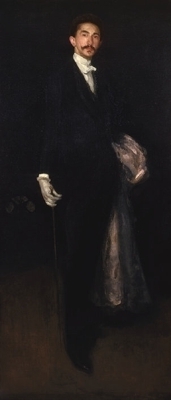
In the interview, David mentions how Patrick introduced him to William C. Carter, who wrote the Introduction to his book.
Patrick Alexander wrote "Marcel Proust’s Search for Lost Time: A Reader’s Guide to The Remembrance of Things Past."
* http://www.proustguide.com
*He also tweets the whole novel (https://mobile.twitter.com/ProustTweet) and runs the Proust Group on Yahoo.
*Patrick's drawings:
http://www.proustguide.com/ProustSITE...
*SPOILERS!!
Thank you for the warning, Marcelita!
I didn't want to research too much cause I was afraid I'd run into spoilers. So there's a book of portraits of many characters? That's cool. I'll check it out once I'm finished with the novel.
I didn't want to research too much cause I was afraid I'd run into spoilers. So there's a book of portraits of many characters? That's cool. I'll check it out once I'm finished with the novel.
 And...I may have already posted this somewhere.
And...I may have already posted this somewhere. There is a French Proust blog by Patrice Louis.
He has listed all 2,521 characters.
From this list, you can discover which characters are Real vs Fiction.
Naturally, SPOILERS!
http://lefoudeproust.fr/?page_id=78
 Concerning our earlier discussion of Charlus appearance. I am nearing the end of "The Captive" and have come across a couple of items of information that do not affect the plot (at least to the point where I am at) but indicate my visualization of him was significantly off.
Concerning our earlier discussion of Charlus appearance. I am nearing the end of "The Captive" and have come across a couple of items of information that do not affect the plot (at least to the point where I am at) but indicate my visualization of him was significantly off.1. Somewhere in S & G (I don't remember where) the Narrator observing Charlus walking states that he "waddled obesely) (Scott Montcrieff translation)
2. In "The Captive" Charlus and the Narrator are in conversation and Charlus, referring to his age states that he is "past Forty" and the Narrator says in an aside "in fact he was past Sixty."
I have to admit I find it hard to reason how to reconcile this with the age of an even older Guermantes generation in Mme Villparesis and perhaps others I can't recall.
 Whoa ... we've made it halfway! I feel that I could never turn back now. What a delight. Except of course for the terrifying themes of complete isolation and constant disillusionment.
Whoa ... we've made it halfway! I feel that I could never turn back now. What a delight. Except of course for the terrifying themes of complete isolation and constant disillusionment.It also occurred to me that the Dreyfus affair serves as an illustration of the power of the stories we hear that make us form opinions about people without knowing "the truth" -- which we can in fact never really know. Just as Dreyfus was framed, the constant lies told by Oriane for giggles have real consequences. They're not easily washed away. Once stories about people are out there, they're incredibly difficult, if not impossible, to clear up. They become reality, in effect.
 Dwayne wrote: "Whoa ... we've made it halfway! I feel that I could never turn back now. What a delight. Except of course for the terrifying themes of complete isolation and constant disillusionment.
Dwayne wrote: "Whoa ... we've made it halfway! I feel that I could never turn back now. What a delight. Except of course for the terrifying themes of complete isolation and constant disillusionment.It also occu..."
Interesting points Dwayne. If you have time, I'd be interested in hearing a little more on how you see complete isolation and constant disillusionment reflected in the novel. Also be interested in a couple of examples of Oriane's lies. No need to find quotes, just something like "at such and such party she said this to that person. I'm almost two volumes ahead of the reading schedule so I sometimes need such memory joggers to remind me of the specifics of a comment.
I know as a Proust Reader I certainly feel complete isolation and constant disillusionment. If it wasn't for our brave little Goodreads Group spread across at least three continents, I'd have no one to talk to about ISOLT. Even when I mention that I'm reading Proust to my local book club they look at me with a mixture of horror and pity like I just said I was in the process of cutting off my arms with a butter knife. I read in a review of a Proust Bio that interest in Proust is experiencing a "dramatic revival." I'm suspicious of that. Interest in Proust the man or Proust's influence on other writers does not equate to folks actually reading ISOLT. I'l get off my soapbox now, My isolation and disillusionment are showing.
 Dave wrote: "Dwayne wrote: "Whoa ... we've made it halfway! I feel that I could never turn back now. What a delight. Except of course for the terrifying themes of complete isolation and constant disillusionment..."
Dave wrote: "Dwayne wrote: "Whoa ... we've made it halfway! I feel that I could never turn back now. What a delight. Except of course for the terrifying themes of complete isolation and constant disillusionment..."Dave, I am in awe of your being ahead of the reading schedule. Nice! I'm kind of a slow reader, and am especially so with Proust.
I am having trouble thinking of an exact instance of a lie delivered by Oriane, but my sense of her is that she -- like all of the Guermantes in The Guermantes Way -- is a gossip who tells stories for effect with little regard for how they may affect others' perceptions of the subjects of the stories. Maybe instead of lies, I should have said her blunt delivery of her opinions as fact ... her opinions on which she flip-flops to suit the listener, or to get the greatest reaction. Now I'm wishing I'd taken better notes! But I get the sense that we can never know if what she says is actually true. Same for her husband -- the deal about how she's exhausted and won't want to go to the party, but then she seems energized and perfectly ready to party all night. Which is the truth? Who is telling the "truth?"
And that leads to the sense of isolation. In reading the novel, I've been noting where the narrator talks about how we can never truly know another person. All that we have is our perception of them, and time and time again, that perception has been proven less than accurate for the narrator in the novel. And the change! There are passages about how people change from instant to instant -- if you can't know someone now, you certainly won't know them a minute from now, much less in a year or five. Isolating. All we have as "true" are our perceptions and memories. Alongside this, there's the theme of names and how names conjure a meaning and an idea of a place or person -- and then meeting with that person or place face-to-face ends up being a disillusioning experience.




